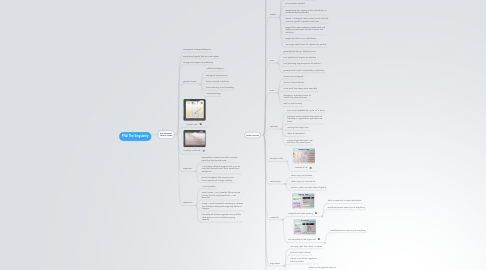
1. Ray Kurzweil, Vernon Vinge
1.1. emergence of superintelligence
1.2. predictions beyond that are meaningless
1.3. change can happen very suddenly
1.4. general causes
1.4.1. artificial intelligence
1.4.2. biological enhancement
1.4.3. brain-computer interfaces
1.4.4. brain scanning, mind uploading
1.4.5. nanotechnology
1.5. Moore's Law
1.6. Paradigm Shift Rate
1.7. argument
1.7.1. extrapolation shows human-like computer capacity a few decades away
1.7.2. AI will make sufficient progress that once we cross that threshold, we'll have superhuman intelligence
1.7.3. once this happens, the economy and human society will change radically
1.8. objections
1.8.1. AI isn't possible
1.8.2. super-human AI isn't possible (there is some intrinsic limit to how powerful an AI can become)
1.8.3. cheap AI would cause the economy to collapse and therefore destroy the singularity before it happens
1.8.4. humanity will follow a sigmoid curve, just like other species, once it reaches carrying capacity
2. Robin Hanson
2.1. economics of whole brain emulation
2.2. uploaded, simulated minds
2.3. assumptions
2.3.1. "AI" is emulated minds
2.3.2. minds are black boxes, no splices, etc.
2.3.3. free market assumption (as reference point)
2.4. generic future
2.4.1. better technology
2.4.2. bigger organizations
2.4.3. more specialization
2.4.4. better, cheaper music, entertainment, games, ...
2.4.5. more inequality, more top performance
2.5. robots
2.5.1. robots can do most things humans can
2.5.2. immortality (provided it can afford it)
2.5.3. travel via transmission of software
2.5.4. no ecosystem needed
2.5.5. reproduction by copying mature individuals, no childhood/training needed
2.5.6. copies = changes in labor market, current limit to economic growth is people production
2.5.7. wages fall to near hardware maintenance cost (supply and demand), for both humans and machines
2.5.8. wages less than human subsistence
2.5.9. non-wage assets (land, etc.) grows very quickly
2.6. ems
2.6.1. generally feel human, behave human
2.6.2. but: uploads and copies are selective
2.6.3. first uploading: big companies for workers
2.6.4. preference for smart, conscientious, workaholic
2.7. ems
2.7.1. choice of mind speeds
2.7.2. choice of virtual bodies
2.7.3. more work, less sleep, more inequality
2.7.4. deception, motivation easier to detect than physical brains
2.7.5. work in virtual variety
2.8. speedup
2.8.1. ems can be speeded up, up to 10^7 times
2.8.2. speedup means potential elimination of hierarchy in organizations (just speed up boss)
2.8.3. running fast is high class
2.8.4. retire at slow speed
2.8.5. speed of light becomes "city size limit" for virtual actors
2.9. varieties of life
2.9.1. varieties of life
2.10. social issues
2.10.1. which copy is my friend?
2.10.2. which copy am I married to?
2.10.3. solution: make and retire teams together
2.11. inequality
2.11.1. inequality has been growing
2.11.1.1. alpha is exponent in Pareto distribution
2.11.1.2. wealthiest person owns 0.2% of everything
2.11.2. em inequality will be higher still
2.11.2.1. wealthiest person owns 3% of everything
2.12. legal issues
2.12.1. is a copy a gift, loan, stock, or slave?
2.12.2. limit risk, black markets
2.12.3. clan as a unit of law, regulation, finance, politics
2.12.4. mind theft
2.12.4.1. stolen minds might be tortured
2.12.4.2. stolen minds might compete with you
2.12.4.3. open source minds
2.13. notes
2.13.1. interesting analysis, but conclusions and problems hinge on "black box human-like minds"
2.13.2. customized AI avoids most of these problems while preserving the benefits
2.14. open questions
2.14.1. what will happen to the economy if most tasks can be automated?
2.14.2. will people starve because wages go to zero?
2.14.3. will very few people own all the "means of production"?
2.14.4. old argument: Luddites, Marx, etc.
2.14.5. serious analysis needed, including simulations (next year: multi-agent simulations)
